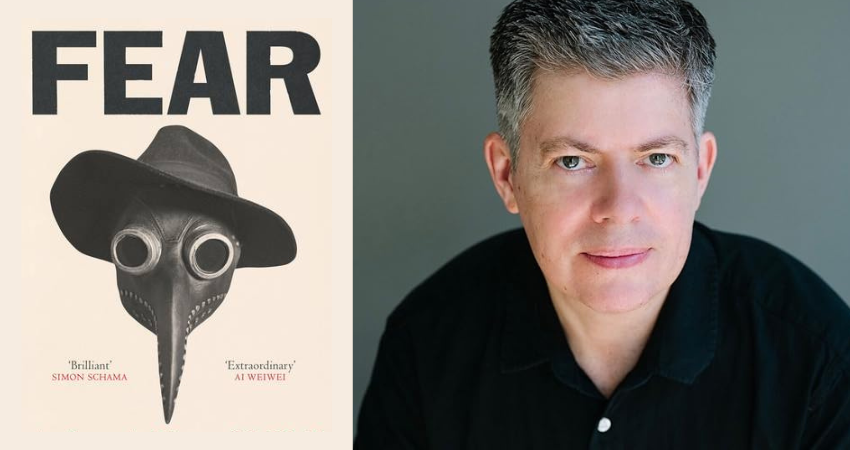Fear: An Alternative History of the World, Robert Peckham, Profile Books
What do you fear? Fear can be caused by an encounter with a venomous snake or the sound of warplanes overhead, where the possibilities of injury, pain or death are obvious, but it can also be invoked by entering a dark, unfamiliar building where one has no idea what one may encounter.
Robert Peckham argues that fear is often an unacknowledged motivator for history. In his book he describes the fear of ‘God, death, markets, technology, terrorism, war, climate change and novel viruses’. Peckham also writes about government, lack of government, crowds and popular culture. Yet there are varied and conflicting ideas about what fear is, and a blurring of the lines between fear and other, related emotions, such as panic, anxiety, phobia and terror. It is a malleable word and one widely applicable.
Fears of unpredictability and loss are often manipulated by politicians to give them power. Government thrives when it gives the populace stability. Yet the likes of Ronald Reagan and Trump have profited from their claims that government should be feared. In their reckoning, freedom is related to lack of restrictions, and restrictions create fear.
Further, Trump campaigned on projected fears – fear of the stranger, fear of cultural change, a fear of loss of jobs and lifestyle – though in some cases, ‘fear’ might not be the right word – and ‘resentment’ might be closer to it. Now that he is back in power, Trump creates fear through chaotic aggression.
This matches somewhat the theory of Edmund Burke that rulers are able to exploit fear when there is fear of the unknown. Burke suggests that this is why rulers act aloof – so they are unreadable and unpredictable. Richard Nixon thought he could make the Russians fear him through portraying himself as a madman capable of snapping at any time, with unpredictable results.
Rulers can be motivated by fear, too. With industrialisation came a concentration of people in close proximity, and therefore a fear of the masses. These fears can also be traced back to ancient Greece, where there was suspicion of the base motivation of crowds, of impulsive herd mentalities. There is ample evidence of this, including Trump rallies.
Fear can be caused by not enough information and by too much information. Ignorance is bliss, yet ignorance also fuels paranoia. Peckham writes about how during the AIDS crisis, panic was fuelled by a media focus on the issue, yet there was also a lack of helpful and calming information. A British ad campaign explicitly warned that ignorance was the biggest killer. Yet when it comes to climate change, for example, information about the seriousness of the situation may cause fear for those unable to cope with its effects, who otherwise might calmly adapt to incremental changes. At Chernobyl, Soviet officials, who thought panic a bigger danger than fear, justified media blackouts and lies.
Fear can be rational but can tip into irrationality. For Burke, fear unhinges our capacity for reason. Fear can fuel paranoia, which leads to irrational behaviour. For the Greeks and Edmund Burke, there is a danger the response to fear will be panic. For Val Peterson, tasked by the US government with figuring out nuclear war scenarios, panic was as effective as bombs in destabilising society.
Yet, for Locke, fear has its uses in keeping us working, alert and thinking. John F Kennedy said that fear of nuclear war was important for avoiding it. For Hobbes, who influenced Locke, fear of a strong government – the threat of punishment – binds society together – without it, society will be anarchic, and we simply fear each other. The French Revolution seemed to confirm Hobbes’ analysis, yet the evidence from totalitarian societies seems to indicate the opposite – that when people are fearful of government they also mistrust (with good reason) their fellow citizens.
While Locke thinks fear motivates us to action, he may be thinking of a healthy level of fear, though that may be a contradiction, and a better word may be something like ‘wariness’. Other theorists such as Robert Burton, the author of The Anatomy of Melancholy, note the paralysing nature of fear – quite the opposite of Locke’s useful fear. In this sense, paralysis is as unhelpful as panic, but they seem like opposite behaviours. In Macbeth, Shakespeare implies a difference between fear that motivates and fear that paralyses. President Frankling Roosevelt was possibly talking about this second sense of fear as paralysing when he famously said, ‘The only thing we have to fear is fear itself’.
Thomas More, in his Utopia, describes two types of fear: acceptable and unacceptable. There is the fear of God, which binds society through encouraging moral action, and there is fear of hunger and destitution, which prompts antisocial and desperate behaviour. Martin Luther also distinguished between good and bad fears, but distinguished them less in what behaviour they prompted, and more in where the fear stemmed from – God or the Pope – the former being good, the latter being bad. Yet there is also the sense that Luther was trying to banish fears, by invoking a loving God who wanted to motivate through gratitude not fear.
Through religious history we can note the prominence of fear: gods, the ultimate authorities, are to be pleased, placated, against their propensity to unpredictable and detrimental behaviour. Yet the Hebrew Bible, as it progresses, is an exercise, in part, in overturning, in counter-cultural fashion, the picture of a vengeful god.

In the Gospels, Jesus is portrayed as a fearless character, unafraid of authorities religious and political alike. He does warn his followers that they will have plenty to fear: poverty, ridicule, persecution, the division of families, even death, but in the end, he is confident that it is love, experienced in communities of the marginalised through the action of the divine, that will prevail, rather than the power of the powerful.
Nick Mattiske blogs on books at coburgreviewofbooks.wordpress.com and is the illustrator of Thoughts That Feel So Big.













1 thought on “The Power of Fear: A Driving Force in History and Politics”
Re “ignorance is bliss”
Ignorance of lies and deceptions (=most mainstream news and establishment decrees) is bliss because exposing yourself to that is self-propagandization.
Ignorance of truths is not, or only temporarily or rarely, bliss because it is ultimately self-defeating …. https://johnmichaeldemarco.com/15-reasons-why-ignorance-is-not-bliss
The FALSE mantra of “ignorance is bliss”, promoted in the latter sense, is a product of a fake sick culture that has indoctrinated its “dumbed down” (therefore TRULY ignorant, therefore easy to control) people with many such manipulative slogans. Eg…
““We’re all in this together” is a tribal maxim. Even there, it’s a con, because the tribal leaders use it to enforce loyalty and submission. … The unity of compliance.” — Jon Rappoport, Investigative Journalist
You can find the proof that ignorance is hardly ever bliss (and if so only superficial temporary fake bliss), and how you get to buy into this lie (and other self-defeating lies), in the article “The 2 Married Pink Elephants In The Historical Room –The Holocaustal Covid-19 Coronavirus Madness: A Sociological Perspective & Historical Assessment Of The Covid “Phenomenon”” … https://www.rolf-hefti.com/covid-19-coronavirus.html
“Separate what you know from what you THINK you know.” — Unknown
“If ignorance is bliss, why aren’t there more happy people?” — John Mitchinson
“Repeating what others say and think is not being awake. Humans have been sold many lies…God, Jesus, Democracy, Money, Education, etc. If you haven’t explored your beliefs about life, then you are not awake.” — E.J. Doyle, songwriter